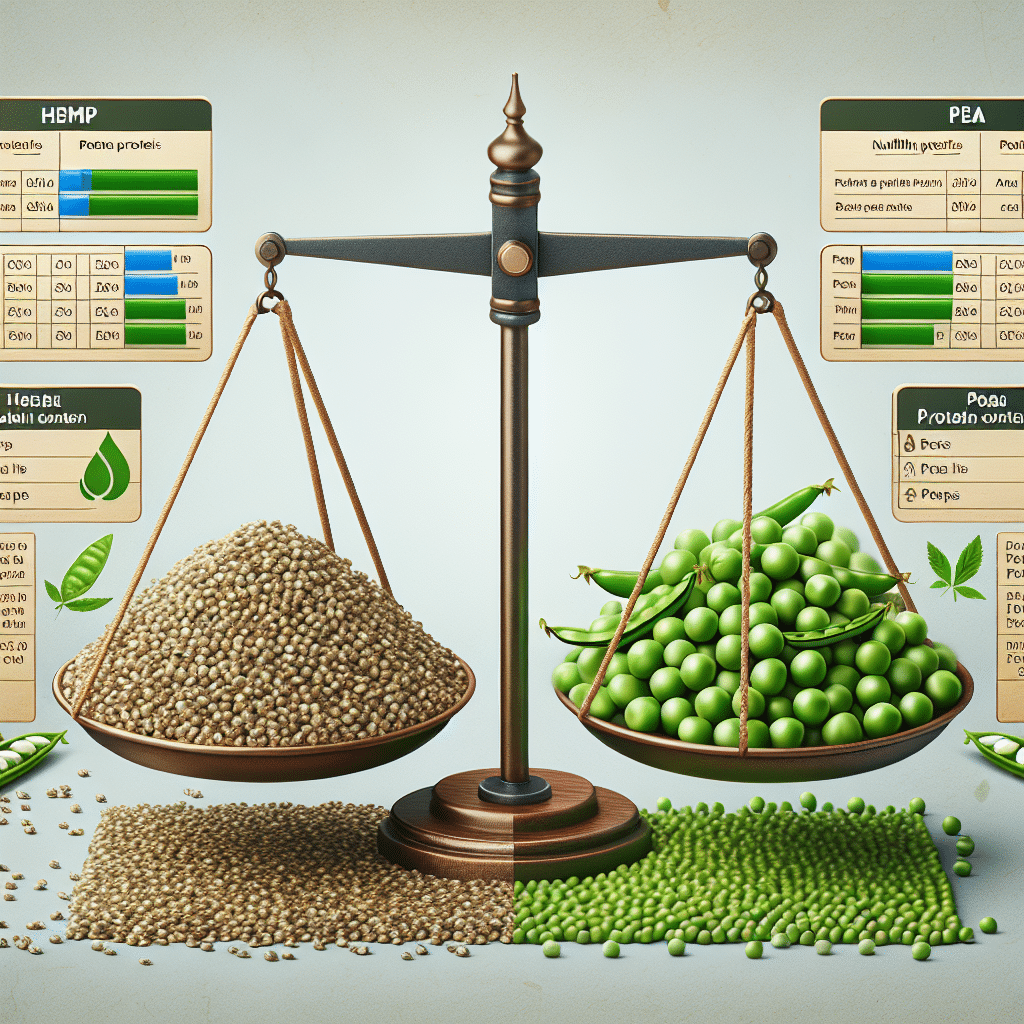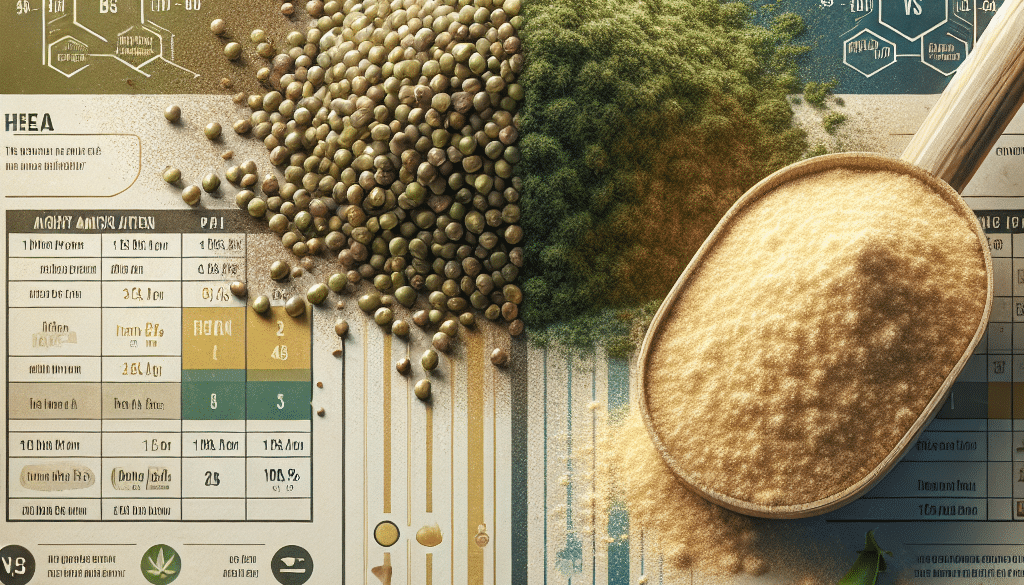Hemp vs Pea Protein: A Detailed Comparison
-
Table of Contents
- Hemp vs Pea Protein: A Nutritional Showdown
- Understanding Hemp Protein
- Understanding Pea Protein
- Nutritional Comparison
- Protein Quality and Content
- Fiber and Digestibility
- Fat Content and Composition
- Mineral Content
- Environmental Impact
- Taste and Texture
- Use Cases and Versatility
- Conclusion: Choosing the Right Protein for You
- Discover ETprotein’s Premium Plant Proteins
Hemp vs Pea Protein: A Nutritional Showdown

As the demand for plant-based proteins continues to rise, consumers are often faced with the challenge of choosing the best source to fit their dietary needs and lifestyle preferences. Among the plethora of options, hemp and pea proteins have emerged as two popular contenders. This article delves into a detailed comparison of hemp and pea protein, examining their nutritional profiles, benefits, and potential drawbacks to help you make an informed decision.
Understanding Hemp Protein
Hemp protein is derived from the seeds of the Cannabis sativa plant. Despite its association with marijuana, hemp seeds contain only trace amounts of THC, the psychoactive compound, and are safe and legal to consume. Hemp protein is known for its earthy taste and is often praised for its nutritional completeness.
- Rich in Essential Amino Acids: Hemp protein contains all nine essential amino acids, making it a complete protein.
- High in Fiber: Hemp is an excellent source of dietary fiber, which aids in digestion and promotes a healthy gut.
- Beneficial Fats: It includes a balanced ratio of omega-3 to omega-6 fatty acids, which are crucial for heart health and inflammation reduction.
- Minerals and Antioxidants: Hemp seeds are packed with minerals like magnesium, iron, and zinc, as well as antioxidants.
Understanding Pea Protein
Pea protein is extracted from yellow split peas and has gained popularity due to its high protein content and hypoallergenic nature. It is a favorite among athletes and those looking to increase muscle mass without consuming dairy or soy-based proteins.
- High Protein Content: Pea protein is typically more concentrated in protein per serving compared to hemp.
- Low in Allergens: It is naturally gluten-free and soy-free, making it a safe choice for individuals with common food sensitivities.
- Rich in Iron: Pea protein is an excellent source of iron, which is vital for transporting oxygen throughout the body.
- Branch Chain Amino Acids (BCAAs): It contains a significant amount of BCAAs, which are essential for muscle building and recovery.
Nutritional Comparison
When comparing hemp and pea protein, it’s important to consider their nutritional differences to determine which might be more suitable for your dietary needs.
Protein Quality and Content
Hemp protein typically provides around 15 grams of protein per 30-gram serving, while pea protein often offers 20-25 grams per serving. Although pea protein has a higher protein content, hemp protein offers a complete amino acid profile, which is rare for plant-based proteins.
Fiber and Digestibility
Hemp protein is higher in fiber, with around 8 grams per serving, compared to pea protein’s 1-2 grams. The high fiber content in hemp protein can aid in digestion but may also cause bloating or gas in sensitive individuals. Pea protein is generally considered easy to digest, with fewer reported digestive issues.
Fat Content and Composition
Hemp protein contains more fat than pea protein, but it includes essential fatty acids that are beneficial for heart health. Pea protein is low in fat, making it a leaner protein option for those looking to reduce their fat intake.
Mineral Content
Both proteins are good sources of minerals, but they differ in types and amounts. Hemp protein offers a wider variety of minerals, while pea protein is particularly high in iron.
Environmental Impact
The sustainability of protein sources is an important consideration for many consumers. Hemp is a robust crop that requires minimal water and pesticides, making it environmentally friendly. Pea protein also has a relatively low environmental footprint, as peas fix nitrogen in the soil, reducing the need for synthetic fertilizers.
Taste and Texture
The taste and texture of protein powders can be a deal-breaker for some. Hemp protein has a nutty, earthy flavor and a gritty texture that may not blend as smoothly as other proteins. Pea protein has a more neutral taste and a smoother texture, making it a more versatile ingredient in shakes and recipes.
Use Cases and Versatility
Hemp protein is often used in baking and as a fiber supplement due to its texture and nutritional profile. Pea protein is commonly found in protein shakes, bars, and meat substitutes because of its high protein content and smooth consistency.
Conclusion: Choosing the Right Protein for You
Both hemp and pea proteins offer unique benefits and can be excellent additions to a balanced diet. Hemp protein is ideal for those seeking a complete protein with additional fiber and healthy fats. Pea protein is suitable for athletes or individuals looking to increase their protein intake without additional carbohydrates or fats.
Ultimately, the choice between hemp and pea protein should be based on your nutritional needs, dietary restrictions, taste preferences, and environmental considerations. It’s also important to remember that incorporating a variety of protein sources can provide a broader range of nutrients and benefits.
Discover ETprotein’s Premium Plant Proteins
If you’re looking to incorporate high-quality plant proteins into your diet, ETprotein offers a diverse range of products to meet your needs. Their organic pea and hemp proteins are produced with the highest standards, ensuring you receive the best in terms of nutrition and taste.
ETprotein’s commitment to non-GMO, allergen-free, and neutral-tasting products makes them a top choice for consumers seeking clean and sustainable protein options. Whether you’re formulating new food products or simply looking for a nutritious protein boost, ETprotein has you covered.
About ETprotein:
ETprotein, a reputable plant protein vegan protein Chinese factory manufacturer and supplier, is renowned for producing, stocking, exporting, and delivering the highest quality organic bulk vegan protein and plant proteins. They include Organic rice protein, clear rice protein, pea protein, clear pea protein, watermelon seed protein, pumpkin seed protein, sunflower seed protein, mung bean protein, peanut protein etc. Their offerings, characterized by a neutral taste, non-GMO, allergen-free attributes, cater to a diverse range of industries. They serve nutraceutical, pharmaceutical, cosmeceutical, veterinary, as well as food and beverage finished product distributors, traders, and manufacturers across Europe, USA, Canada, Australia, Thailand, Japan, Korea, Brazil, and Chile, among others.
ETprotein specialization includes exporting and delivering tailor-made protein powder and finished nutritional supplements. Their extensive product range covers sectors like Food and Beverage, Sports Nutrition, Weight Management, Dietary Supplements, Health and Wellness Products, and Infant Formula, ensuring comprehensive solutions to meet all your protein needs.
As a trusted company by leading global food and beverage brands and Fortune 500 companies, ETprotein reinforces China’s reputation in the global arena. For more information or to sample their products, please contact them and email sales(at)ETprotein.com today.














